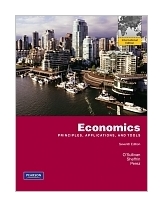|
||
• wydawnictwa polskie
• Zamów informacje o nowościach z wybranego tematu • kontakt
• Cookies na stronie |
ECONOMICS PRINCIPLES APPLICATIONS AND TOOLSO'SULLIVAN A. SHEFFRIN ST. PEREZ ST.wydawnictwo: PEARSON ED , rok wydania 2011, wydanie VIIcena netto: For Principles of Economics courses. Table of Contents
PART 1 Introduction and Key Principles 1 Introduction: What Is Economics? 2 The Key Principles of Economics 3 Exchange and Markets 4 Demand, Supply, and Market Equilibrium
PART 2 The Basic Concepts in Macroeconomics
5 Measuring a Nation’s Production and Income 6 Unemployment and Inflation
PART 3 The Economy in the Long Run
7 The Economy at Full Employment 8 Why Do Economies Grow?
PART 4 Economic Fluctuations and Fiscal Policy
9 Aggregate Demand and Aggregate Supply 10 Fiscal Policy 11 The Income-Expenditure Model 12 Investment and Financial Markets
PART 5 Money, Banking, and Monetary Policy
13 Money and the Banking System 14 The Federal Reserve and Monetary Policy
PART 6 Inflation, Unemployment, and Economic Policy
15 Modern Macroeconomics: From the Short Run to the Long Run 16 The Dynamics of Inflation and Unemployment 17 Macroeconomic Policy Debates
PART 7 The International Economy
18 International Trade and Public Policy 19 The World of International Finance
PART 8 A Closer Look at Demand and Supply
20 Elasticity: A Measure of Responsiveness 21 Market Efficiency and Government Intervention 22 Consumer Choice Using Utility Theory
PART 9 Market Structures and Pricing
23 Production Technology and Cost 24 Perfect Competition 25 Monopoly and Price Discrimination 26 Market Entry and Monopolistic Competition 27 Oligopoly and Strategic Behavior 28 Controlling Market Power: Antitrust and Regulation
PART 10 Externalities and Information
29 Imperfect Information: Adverse Selection and Moral Hazard 30 Public Goods and Public Choice 31 External Costs and Environmental Policy
PART 11 The Labor Market and Income Distribution
32 The Labor Market, Income, and Poverty 33 Unions, Monopsony, and Imperfect Information 792 pages, Paperback
Po otrzymaniu zamówienia poinformujemy, |


